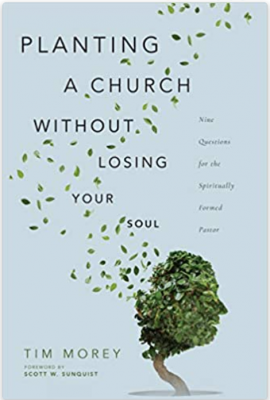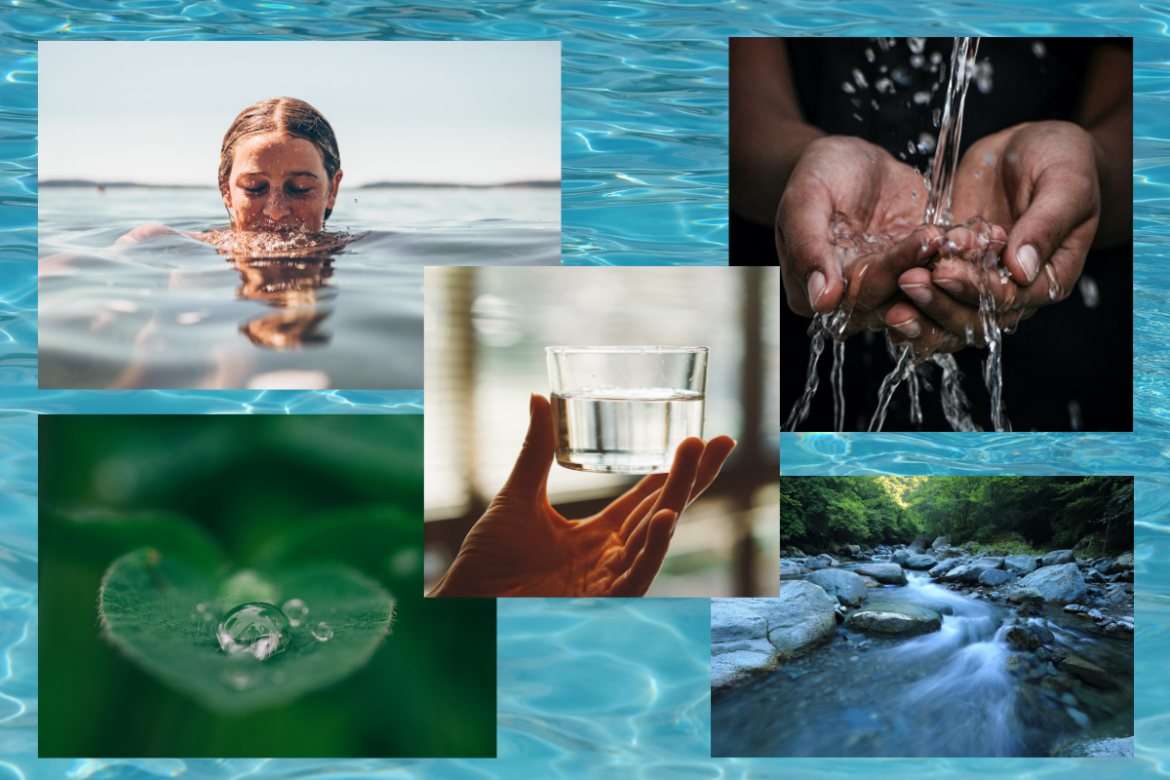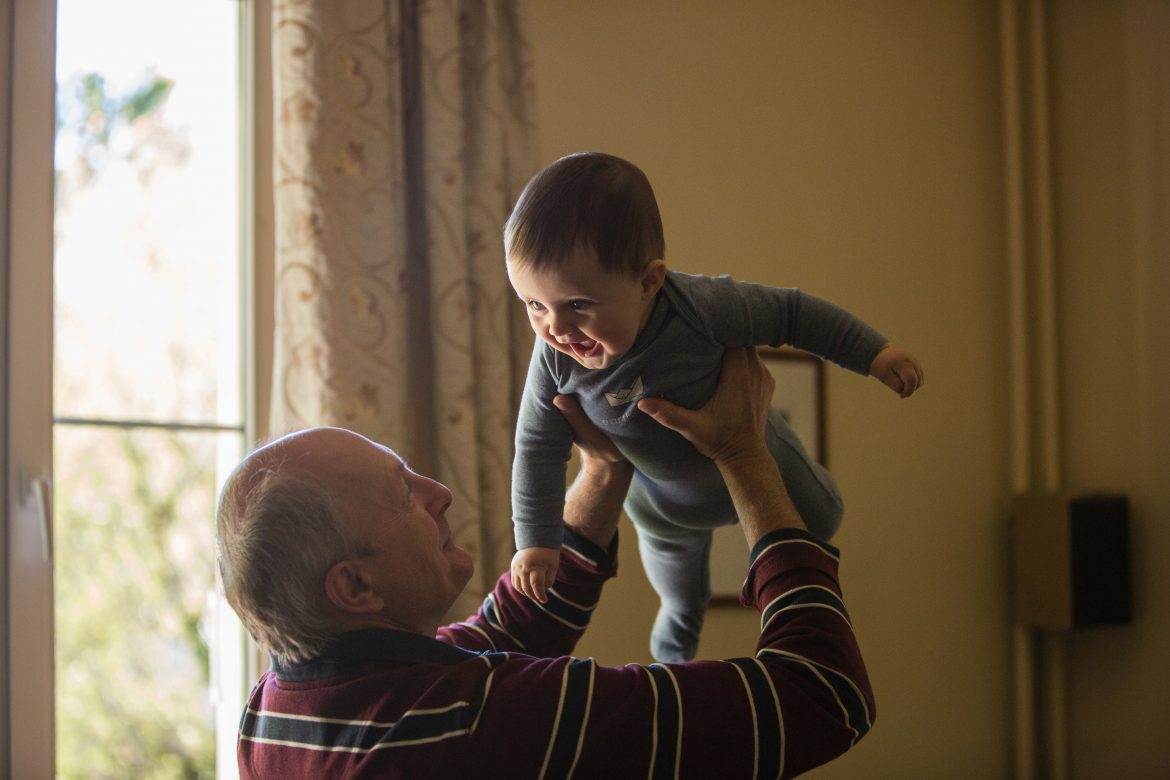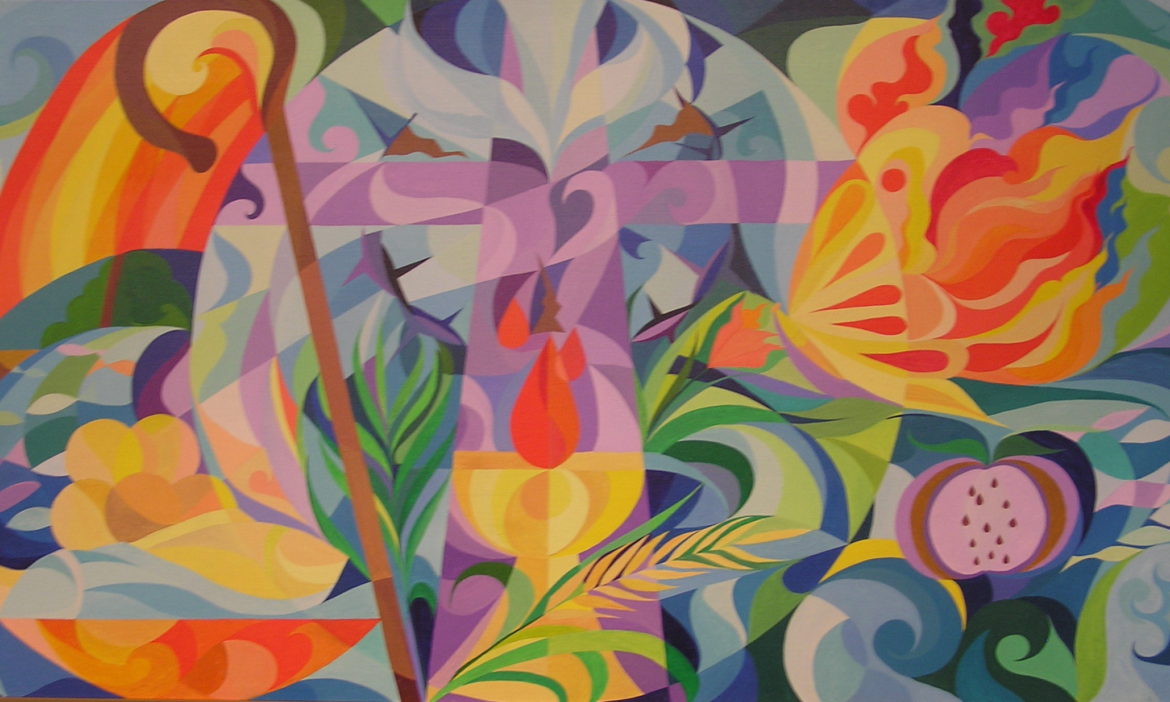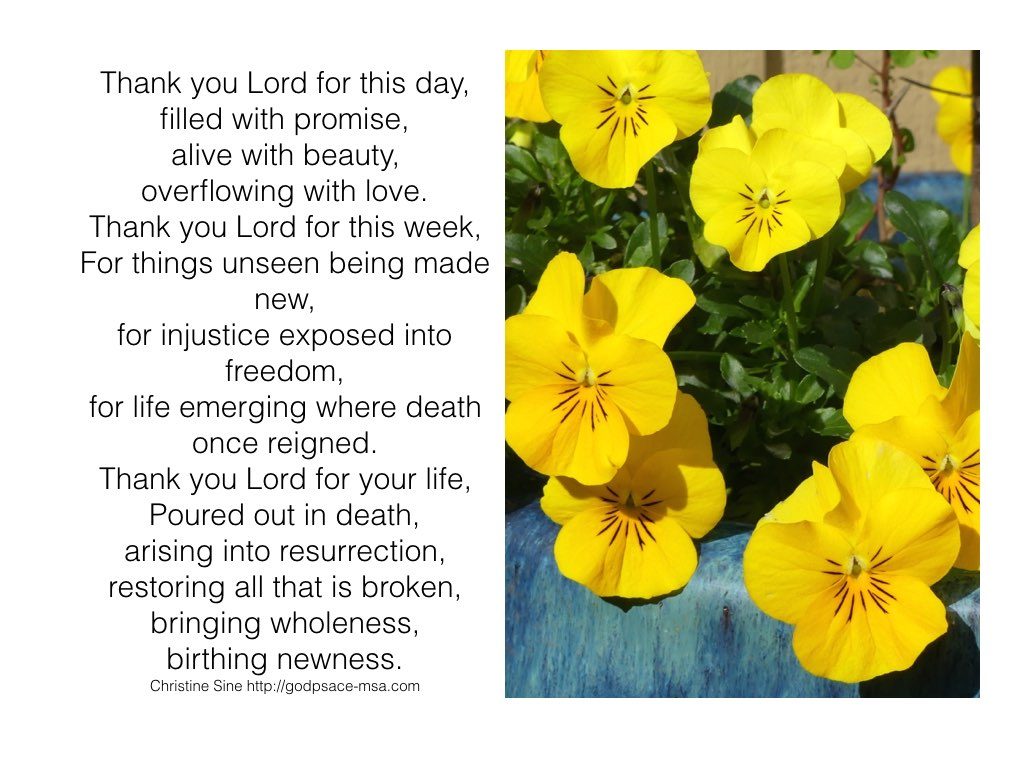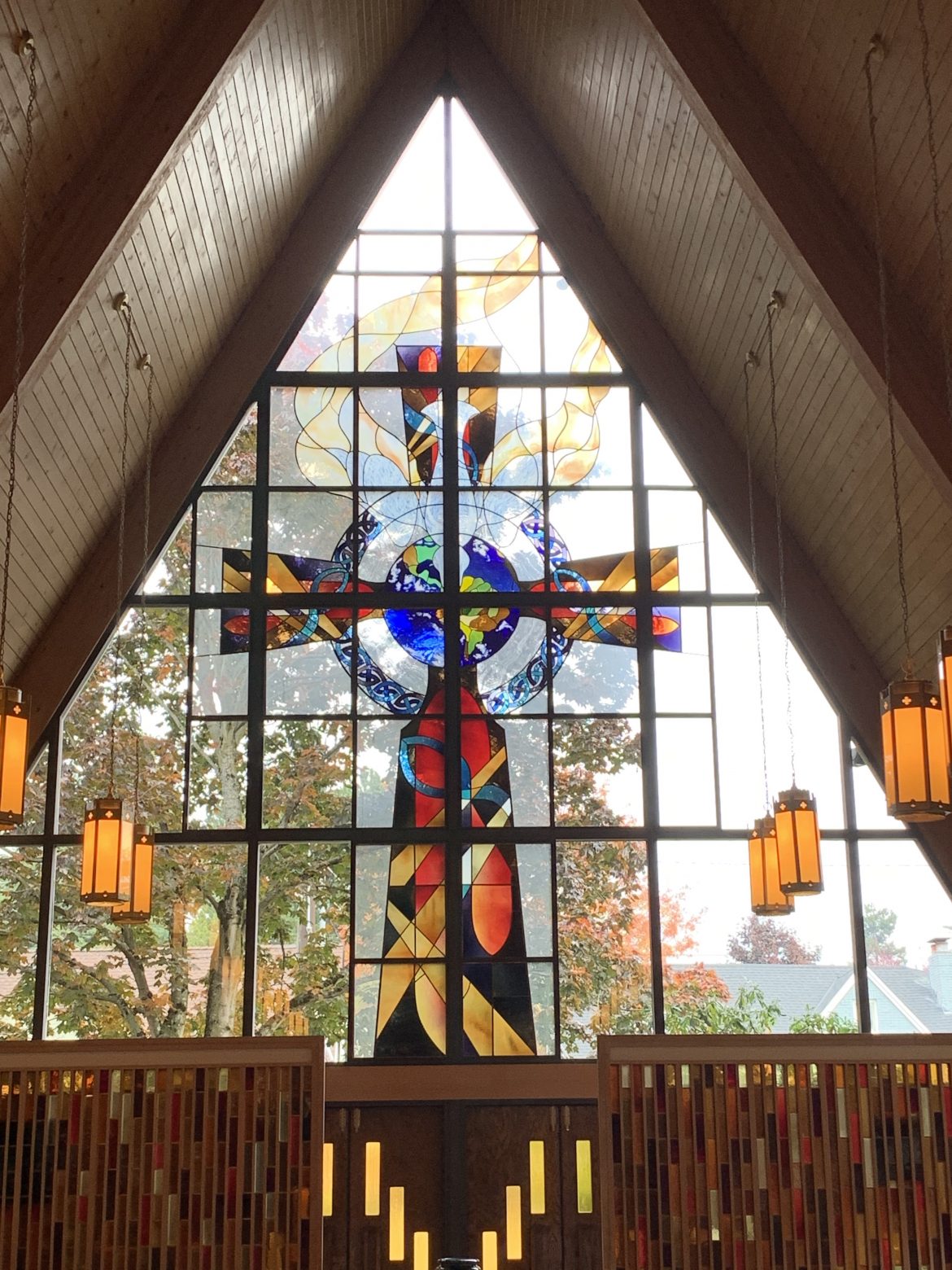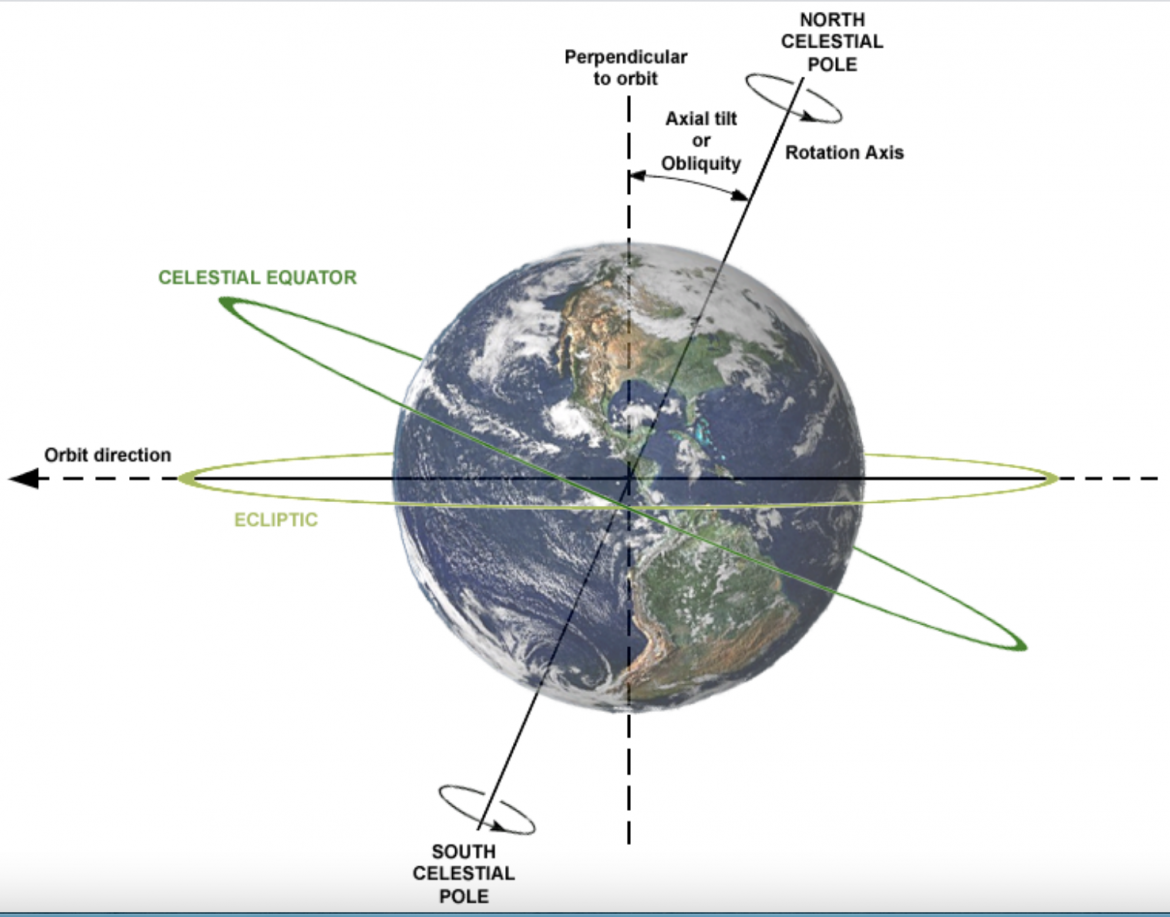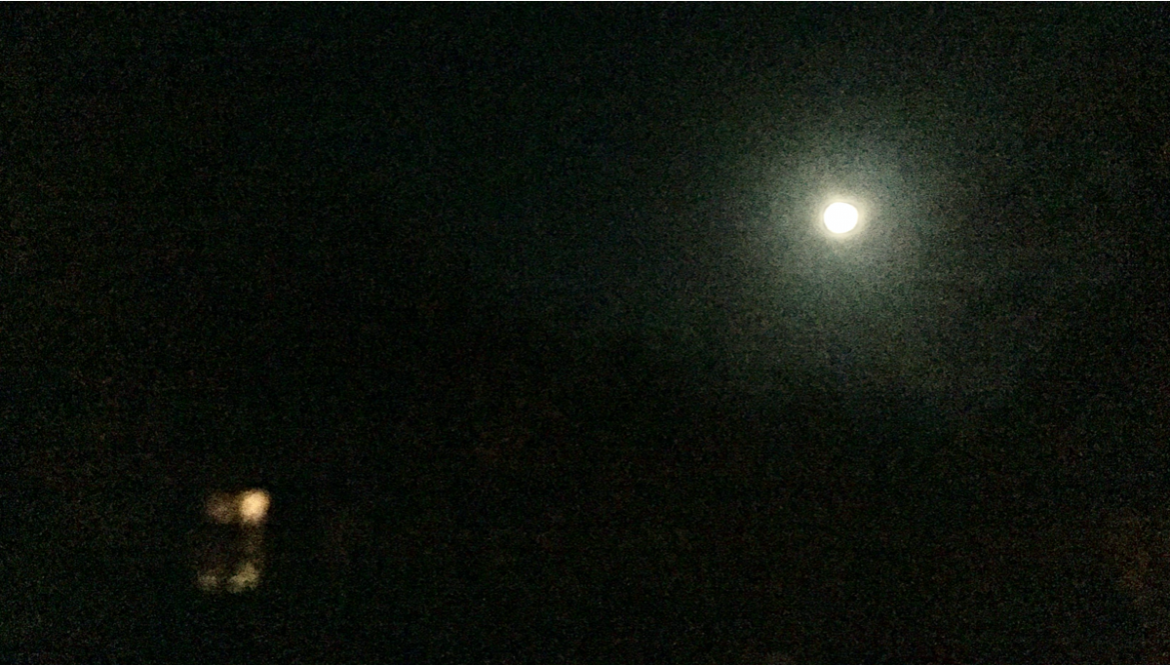guest post by Tim Morey,
As a pastor, I’m always surprised at the power my words have to bring either healing or harm. When we are really listening to the Holy Spirit and to the person in front of us, there are times when we speak a word of grace with the quiet forcefulness of conviction, and are amazed to find that word is powerful enough to break years-long bondages or to heal life-long wounds. And the reverse is also true. A careless or angry word can hit like a baseball bat, embittering a person toward God or the church for years to come.
Two incidents stay with me, even years later. One was with a young worship leader. He was trying to get his feet wet in worship leading, and we were butting heads on how things should be done. I asked him to do one thing, and he did another. I misunderstood his actions as defiance, when in fact he was just young and excited to stretch his creative wings. I took him aside and confronted him. My demeanor was condescending and accusing, assuming the worst of his motives. He felt attacked, lost his temper, and stormed out. Though words of apology and forgiveness were shared in the following days, the relationship was permanently crippled.
Today, years later, he is a much-gifted and much-loved worship leader at a church in a neighboring city. My reaction wounded him badly, and I wonder sometimes, what if my lack of self-control had driven him out of ministry? What if I had derailed this good young man from doing what God designed him to do? And by extension, robbed those that he has fruitfully led from having the blessing of his influence in their lives?
The other incident also involved a heavy word, but thankfully, it was a word delivered in grace. A young man in our church (who I’ll call Tom) began dating a woman who was separated from her husband. A divorce seemed imminent but had not yet occurred. She, of course, felt as if the marriage had been dead for a long time, and saw the divorce as nothing more than a legal formality. She was free to fall in love again, and had.
I sat down with the dating couple. They were all smiles and all hands, practically on each other’s laps, giddy with infatuation. This isn’t right, I told them, as their smiles were slowly replaced by tight lips and hard eyes. She is a married woman, I told him, with a husband hoping to reconcile. He is not your husband, I told her, and you have no right to begin a romance with him, no matter how dead you believe your marriage to be.
To say the meeting got emotional would be an understatement. She sobbed and then shouted, he yelled and then stood so he could yell louder. They stormed off in a torrent of profanity, slammed doors, and screeching tires, vowing never to return to this shitty, judgmental church. They didn’t.
Nearly ten years later I was walking through an airport when I heard a familiar voice call my name. I turned to see Tom, hurrying to get up from the table where he was eating and make his way toward me. He grabbed my hand to shake it, then pulled me into a tight hug. “Man, I hated you so badly for confronting me back then. But I eventually heard you, and I got out of that relationship. I feel like you saved my life,” he said, eyes wet and alive with feeling. “Would you like to meet my wife?” he asked with a shy smile, gesturing to a beautiful young woman still seated at the table. “We’re on our honeymoon,” he said, his face beaming.
As I reflect on the contrast between those two encounters, what immediately stands out to me is my ego. With the worship leader, I (wrongly) felt disrespected, and in my offended state I acted like a petty tyrant. I didn’t ask him why he did what he did, and made no effort to understand what his actions meant to him. Instead, I imputed meaning to his actions, assumed his motives, and reacted accordingly. I used the power of my position to insist that he sit and listen while I scolded him, assigning motives to him that seemed right in my head but in fact were entirely inaccurate.
With Tom, thankfully, my ego wasn’t part of the equation. I was able to speak an appropriately hard truth in a spirit of grace and love, and when things got heated, I didn’t feel the need to defend or to retaliate. And even though it was rejected at first, that word of truth spoken in the right spirit was eventually able to break through his defenses and bring freedom.
“A gentle tongue can break a bone,” the Proverbs tells us (Prov. 25:15). For the leader, our capacity to speak truth from a place of secure love and ego-free grace has everything to do with how we are allowing God to refine our ability to handle power.
(Taken from Planting a Church Without Losing Your Soul: Nine Questions for the Spiritually Formed Pastor by Tim Morey. Copyright © 2020 by Tim Morey. Published by InterVarsity Press, Downers Grove, IL. www.ivpress.com.)
Bio for Tim Morey
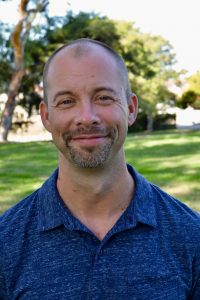
Tim Morey (DMin, Fuller Theological Seminary) is founding and lead pastor at Life Covenant Church in Torrance, California. He serves as a church-planting coach for the Evangelical Covenant Church and as an adjunct professor at Fuller Theological Seminary.
Note: As an Amazon Affiliate, I earn an amount on qualifying purchases. Thank you for your support for Godspace in this way.
by Lisa DeRosa
Today is a gift from our loving God. Today is unlike any other day. Today is an opportunity. God’s mercies are new this morning. His love is unending.
This is the truth that I need as I write this today. When I feel overwhelmed, depressed and anxious, which is most days, I need this truth. Just for today. Just this 24 hours. Today, I am choosing to focus on and share about water because yesterday (March 22nd) was World Water Day. In choosing this one thing today, I know that I will have the capacity to dive into it with God’s help.
This year, the UN is asking: “What does water mean to you?” as part of its campaign for increasing awareness of the huge water issues on our earth. UN Water Facts provides staggering information. We can’t deny it any longer. Some that I found particularly interesting are:
Human Rights
- “Indigenous and tribal peoples care for an estimated 22% of the Earth’s surface, and protect nearly 80% of the remaining biodiversity on the planet, while representing only 5% of the world’s population (ILO, 2017).”
Water, Food and Energy
- “Agriculture (including irrigation, livestock and aquaculture) is by far the largest water consumer, accounting for 69% of annual water withdrawals globally. Industry (including power generation) accounts for 19% and households for 12%. (FAO, AQUASTAT)”
Disasters
- “Around 74% of all natural disasters between 2001 and 2018 were water-related and during the past 20 years, the total number of deaths caused only by floods and droughts exceeded 166,000, while floods and droughts affected over three billion people, and caused total economic damage of almost US$700 billion. (UN WWDR, 2020).”
#Water2Me
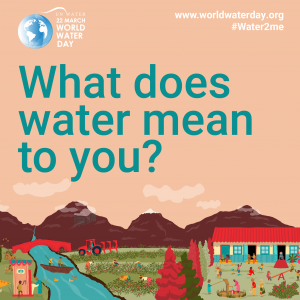
Water is essential for life on earth. I think we all know that, but don’t tend to recognize its importance until we are not able to turn on the faucet, the shower, or need to boil our water so it is safe to use/drink. We rely on pipes to carry water to our household for convenience and take for granted the fact that so many people around the world have to walk for miles to reach water that they then have to carry back home to boil or filter so that it is safe to drink/use.
God, thank you for running water. Thank you for filters that remove toxins and unhealthy particles from the water that I have access to. Please bring justice, hope, and clean water to those who do not experience this on a daily basis. Amen.
Water is not only essential, but it is enjoyable! My favorite memories of growing up were trips to Lake Tahoe, California as our family and extended family stayed in a cabin on the lake during summer vacation. We would fish, raft, swim and build sand castles on the beach. Now that I am older, water helps me to calm down, breathe deeper, and relax. This last year, water meant freedom! After months of lockdown orders, I was able to venture to a local lake and swim carefree of other people being close to me, allowing the physical touch of the water to flow over me. It really helped me feel like I was free from the confines of my home during that time.
I asked others to share, for their voices to be heard, their answers to the question: “What does water mean to you?”.
“Our traditional North American Indigenous people often refer to water as “the first medicine.” Water, in my tradition, and well, every Indigenous tradition I know, is considered sacred. What do I mean by “sacred” in this context? I mean every ocean, every lake, every bog and slew and estuary, every creek, every waterfall, every spring and even the rain, perhaps especially the rain, are considered as gifts from Great Mystery. Many American Indigenous peoples have ceremonies that involve water or reference water. Perhaps this is true of all peoples, including Western Europeans. I think maybe that many of the European tribes, (after all, we are all Indigenous from somewhere) also understood water’s sacredness at one point in their history. I also think, their descendants have largely forgotten just how important, and just how sacred water was and continues to be.”
-taken from the Eloheh Lenten Devotional 2021, used with permission.
“I didn’t know the waters I grew up around. The highways and the faucets and the dams taught me not to notice the land around me, and therefore, not to notice my body or my own story. But I have been learning the past handful of years that when I connect with the land, I find myself as one with a story rooted in water—the rivers, lakes, glaciers, and the ocean. And when I get to know these waters, I learn their pain and the struggles they suffer, like me, under this occupying colonial society. And I find that my own search for connection, being held in community, and freely being myself are bound up in and inseparable from working with these waters to be free again. I want to swim in a river clean of agricultural fertilizers and logging herbicides without having to hike high up to get upstream of where those are happening. I want to drink from a spring without worrying about car pollutants being leached into the soil. I want to walk beside creeks full of salmon without grieving for the people getting sick from consuming their poisoned bodies. In ways such as these is water so profoundly foundational to life that I’ve discovered, along with others with stories not unlike mine, that water is church. We have decided to find spiritual family amongst each other and with the herons, the otters, eagles, elk, salmon, and countless others who’ve also decided they cannot find true life outside of good, clean water. The gifts that water wants to share with us are always there, readily available for those who are ready to notice them.”
—leucanthemum, Duwamish River, Sprouting Moon, used with permission.
“Water and spirit course through the biblical story just like they do in our bodies. In the beginning, the Spirit hovers over the waters of the unformed world like an expectant mother nurturing the life in her womb. In the middle, Jesus furthers the connection between water and Spirit when he declares, “Let anyone who is thirsty come to me and drink.” At the end, when heaven and earth are made one, the New Jerusalem is split by the river of the water of life. We must remember that our lives are water and Spirit, and we live drip by drip. Every drink, every breath, is a baptism. I often think that if I spent my life contemplating water, it would be a life well spent.”—James Amadon, Circlewood
As we have focused on Time to Heal, I know that our earth needs healing too. There are so many different areas that this is true, but just for today, the issues surrounding our water issues is on my heart and I ask for God’s healing power for our water crises.
I came across this prayer by Christine for World Water Day. Please check it out!
Another great resource for how to efficiently water landscape.
What does water mean to you? Share with us in a comment below.
Feature photo above includes photos by Manki Kim, Aaron Burden, Kazuend, Erik Dungan, and mrjn Photography on unsplash.com
UN Campaign image above used with permission.
by Tom Sine
JOIN THE PANDEMIC PARTNERS
In our last post, we invited you to join those who believe this summer may be the beginning of a new normal; to join those seeking to be a difference and make a difference. Remember President Biden suggested the immunization program is going so well that many of us may get a taste of the new normal on July 4th!
However, there are a surprising number of people that are not waiting for the new normal. They are taking the initiative to start creating it right now. For example, I introduced you to Pastor Morgan Schmidt who activated members in her Presbyterian Church in Bend, Oregon to not just wait at home and wait for the pandemic to pass.
Morgan said, “I never thought I would say this, but we’re using Facebook to express love to our neighbors in really meaningful ways.” Morgan added, “one of our first requests… was a gentleman who just said, ‘I’m immuno-compromised. I don’t want to go Safeway. Can I have someone run in and grab my groceries and put them in my trunk?” Pandemic Partners not only responded to this request. Others prepared meals for neighbors.
Reportedly, Pandemic Partner groups are showing up all over the US enabling many communities to begin the journey to a new normal by recovering an old neighborliness.
JOIN THE PANDEMIC PALS
More recently, the New York Times wrote about people on the east coast who are becoming “Pandemic Pals” as they, too, are on a journey back to a new normal. For example, Judy Fien received a call from Serga Nadler, a neighbor in her apartment building that she only knew slightly. Judy asked if she, “would like to go for a walk?”. Judy was surprised but delighted. They started sharing meals in an outdoor space. Both retired, they learned each other’s stories and in a real way became “pandemic pals.”
“Neighbors are proving to be a salvation for some, according to a study by Improvenet, an online company that helps homeowners manage remodeling projects. Nearly 70 percent of the survey’s 2,500 respondents from around the country said they had gotten to know their neighbors better during the pandemic and 25 percent reported frequently socializing with their neighbors. Meanwhile, 57 percent said neighbors have, at times, filled the void left by relatives and friends.”
JOIN THE PANDEMIC PURPOSED PALS
In KEEP SHARP: Build a Better Brain at Any Age, Dr. Sanjay Gupta, who is a Professor of Neurosurgery at Emory University School of Medicine, insists that simply finding ways to be better pals is not enough as we move into our senior years. He urges us as we age to embrace a more compelling sense of purpose for our lives. He also strongly discourages early retirement because too often people not only lose their sense of their reason for being, They also often also spend the aging process including causing early dementia
Dr. Gupta states, “There is power to maintaining a sense of purpose by continuing to learn, discover and complete complex tasks. A sense of purpose means that you see your life as having meaning, a sense of direction and goals to live for its active aging.” (Simon and Shuster, 2021, p. 116)
It is essential that all of us, including those of us who are seniors, become active PURPOSE-FOCUSED PALS to enable all of us to work together to create a healthy and sustainable new normal for all generations, in all nations and God’s good creation.
I want to introduce you to some PANDEMIC PURPOSED PALS that we can all join to create a welcome new normal together. “Some older adults are rejecting lives of leisure – on purpose” is the title of an article that invites baby boomers to discover how discovering a purpose focused “third act” for their own lives and the larger society. “The most important thing about older adults is they’re not done yet,” says Larry Samuel, author of Age Friendly Consulting.
Larry states, “If the first act is about mostly education and youthful exuberance, and the second act mostly about career and family, the third act is about wisdom, self-actualization and leaving some kind of legacy.”
Mr. Marshall worked for Boeing and his wife, Ms. Marshall, had a map making business. They decided to retire early and get “ready to ride into the sunset.” However, it did not take them long to discover that that had little sense of meaning. Ms. Marshal discovered she needed a new sense of purpose for her life in retirement. “The search for meaningful activity underscores many third acts.”
“That question of legacy looms large for many older adults. At 91, however, Bostonian Sylvia Anthony isn’t thinking in those terms. She’s too busy preparing for a refresher course in real estate after renewing a lapsed license. She wants to funnel the proceeds from that job into Sylvia’s Haven that she founded in 1957.” She reports the pandemic has not stopped her yet.
For Sylvia and many of the rest of oldies, there can be no more satisfying ways to spend our third act than finding ways to make a difference by joining others, society and our churches, as we work together to create a new normal that brings justice to our poorest neighbors and restores God’s good creation in this time of environmental crisis.
Couldn’t our churches, that often have more members journeying into their “third act”, enable them to create new ways to live on purpose? Couldn’t our churches enable them to create more purpose-focused lives? Couldn’t we empower them to be a difference in this troubled time of transition? Can’t we enable all followers of Jesus to imagine new ways to be a difference and make a difference that reflects the compassion of Christ? Wouldn’t that be an important role for our churches to play as we slowly migrate out of this horrid pandemic into a future of promise for our struggling world and generation next?
Note: As an Amazon Affiliate, I earn an amount on qualifying purchases.
I love gardening and one of the things I love about living in the northern hemisphere is that Easter coincides with the spring blossoming and planting seasons. It is so spectacular and I will never forget the impact of my first Easter in the northern hemisphere. Daffodils bursting into bloom with bright yellow faces, cherries and apples and almonds beckoning the pollinators that will set the harvest and so many other spectacular blossoms that seem to live out the Easter story. This is what it is all about, I remember thinking. Life, death and resurrection everywhere I look.
What I did not realize until years later is how clearly the story of gardens is also lived out in Jesus’ walk through Holy week. And that has so impacted me that I am unashamedly reposting this article for the second time. I even adapted it for my book, The Gift of Wonder. I encourage you as you get out into God’s garden world during Holy week so that you, too, might reflect on this wonderful journey from garden to garden that Jesus took, no matter whether you are moving into spring or autumn.
She Thought He Was The Gardener
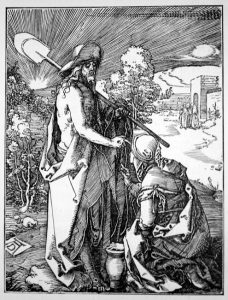
Jesus the Gardener – Albrecht Dürer – Public Domain
In 1511, the German artist Albrecht Dürer fashioned a woodcut of Mary Magdalene’s encounter with the resurrected Jesus as depicted in John 20:15. She has come to the garden tomb looking for Christ’s body, instead she finds a very much alive Jesus and she thought he was the gardener.
This phrase is not a throw away line. It is of cosmic significance! Jesus is indeed the gardener of the new creation.
In the book of Genesis, God creates the garden of Eden, and sculpts Adam and Eve out of its soil to tend and care for it. (Genesis 2:15). It is here that God, the cosmic gardener, comes to walk, to enjoy and interact not just with the caretakers but with all creation. (Genesis 3:8) When Adam and Eve sin, they are expelled, not just from the garden, but also away from this beautiful, intimate relationship they once enjoyed with God.
Journey from the Garden of Suffering
Fortunately, God did not abandoned creation or those created to look after it. The journey of Holy week is a journey back into the garden of God.
Jesus suffering began in the garden of Gethsemane, a garden where his agony is poured out in drops of blood like sweat, that seep into the earth. His pain is symbolic of the pain and suffering that became a part of Adam and Eve’s lives when they were expelled from the garden of Eden.
Journey Through the Garden of Death
On Good Friday there is another garden. Jesus, the second Adam, dies at Golgotha and John notes: in the place where he had been crucified there was a garden and in the garden a new tomb, in which no one had ever been laid. (John 19:41) The garden is a place of death, and Jesus death like the planting of a seed: Unless a seed is planted in the soil and dies it remains alone, but its death will produce many new seeds, a plentiful harvest of new lives (Jn 12:24).
Journey Into the Garden of Resurrection
Yet here in this garden, as in all gardens, new life emerges, because gardens are places of life and resurrection too. As the gospel of John tells the story, and the artist Dürer pictures it, Jesus very fittingly and beautifully appears to Mary Magdalene as the gardener. This is the garden of the resurrection, the new creation garden where the new world of God is revealed in all its glory and everything once more flourishes.
Whereas the Genesis story begins in paradise (a garden) and ends in our present garden world of pain and suffering, the Easter story begins in the garden of pain and suffering and ends in a garden of wholeness and flourishing, a new paradise in which we are once more able to walk intimately with our God and find abundant provision. In this new garden Jesus, the head gardener, once more invites us to be who God created us to be – stewards of all creation, tending this new paradise of wholeness and abundance so that it once more flourishes for all the creatures of the earth to enjoy.
In Isaiah 65 and again in Revelation 21, we see beautiful pictures of this new garden of God. Life and freedom, wholeness and abundance flourish and we look forward in hope to its completion.
Can We Cooperate With Jesus The Gardener?
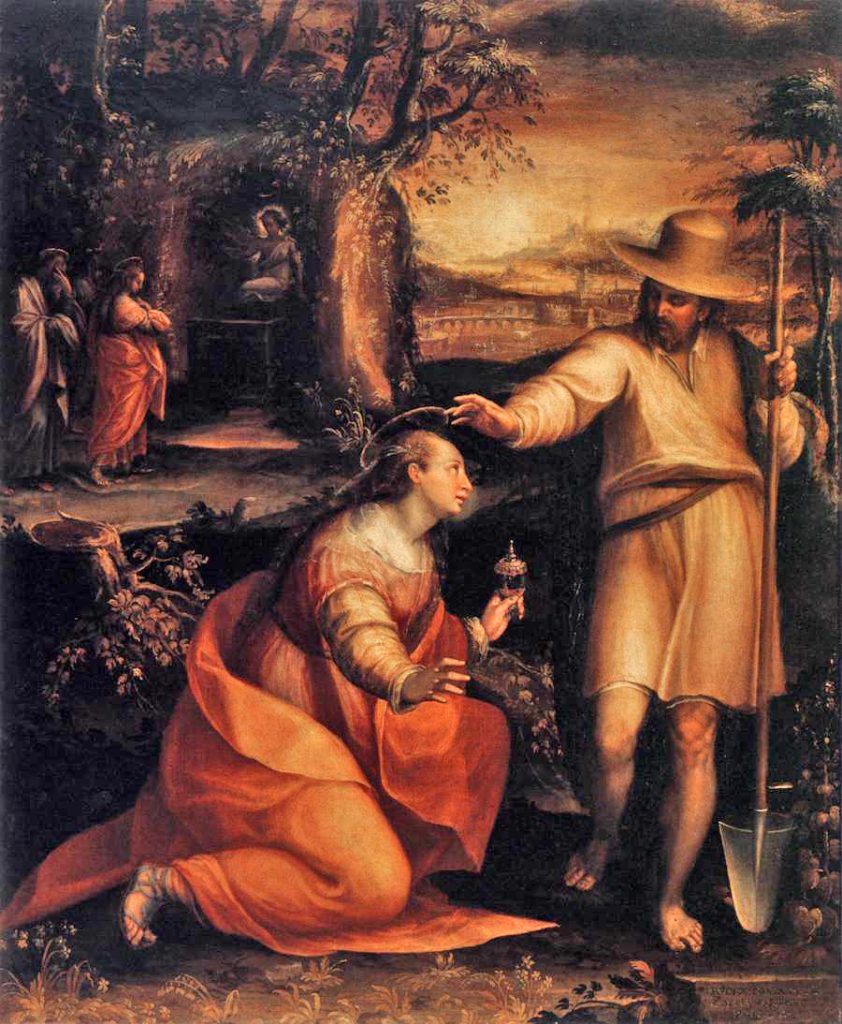
Lavinia Fontana (Italian, 1552–1614), Noli me tangere, 1581. Oil on canvas, 80 × 65.6 cm. Uffizi Gallery, Florence, Italy.
The challenge we face is to cooperate with Jesus the gardener in the work of this garden. In many ways God’s new garden is still in its infancy, and like any newly formed garden, needs to be tended in order to flourish. Soil must be fertilized, seeds planted, watered and nurtured. To see it completed we must willingly journey with Jesus from the garden of Gethsemane with its struggle and suffering, through the garden of death to the new life that begins in the garden of the resurrection.
The old Adam and Eve were excluded from the Garden of Eden by a barrier of angels with flaming swords. Jesus the new Adam, ripped apart the barrier with his death and stands ready to welcome us into the new paradise garden. The barrier that separated us from the holy place of intimacy with God and God’s world has been removed. Now together with all God’s people and indeed with all God’s creation we can enter into the intimacy of relationship with God in a restored world of wholeness and abundance. We must continue to till and fertilize the soil, plant seeds of freedom and generosity and wholeness until the full glory of God’s resurrection created world is revealed.
(For more artwork of Jesus as gardener visit She Mistook him for the Gardener.)
NOTE: As an Amazon associate I receive a small amount for purchases made through the appropriate links in this post. Thank you for supporting Godspace in this way.
Today I decided to post 2 services. One is the usual Taize style service from St Andrews for the Fifth Sunday in Lent, the other is a special musical presentation that was done for St Patrick’s Day. It includes songs and hymns attributed to St. Patrick and St. Columba, a mystical hymn to St. Brigid, and toe-tapping jigs and reels. Vocalist Natalie Ingrisano, fiddler Brandon Vance, and guitarist/keyboardist Henry Lebedinsky I loved this so much that I wanted to give you an opportunity to enjoy it too.
A contemplative service with music in the style-of-Taize for the Fifth Sunday in Lent. Carrie Grace Littauer, prayer leader, with music by Kester Limner and Andy Myers.
by James Amadon
I learned to spin a basketball on my finger when I was 12 years old. It took a lot of practice to toss it in the air, land it on my outstretched finger, and keep it spinning with my free hand. It required just the right amount of spin, a delicate balance of rigidity and flexibility in my finger, and perfect elliptical touches from my free hand to keep it moving. As I learned from countless failures, putting all those together did not come easy.
Now imagine how Earth, our beautiful island home, moves around the sun at 67,000 miles per hour, spins around Earth’s rotational axis at 1,000 miles per hour (at the equator), and shifts its angle to the sun 2.4 degrees each year. Within this whirl of perpetual motion, it is the angular shift that creates the seasons, and brings us to an annual milestone today – the March equinox. After today, there will be more than 12 hours of daylight north of the equator. Readers in the Northern Hemisphere are celebrating the arrival of Spring – here in Seattle, my children are soaking up the emerging sunshine like human seedlings. Readers in the South are welcoming Autumn – I wish you a blessed and cozy entrance into the dwindling daylight.
These coordinated movements have been happening over and over and over again for billions of years. To contemplate such a mystery is to be taken to a place beyond words.
Yet we are verbal species, so we have to try. Scientists describe these movements with the language of physical laws – the steady, predictable, rhythmic, impersonal forces that govern the universe. A cold beauty. The psalmist employs more imaginative language to point us to the Force behind these forces. “When I contemplate Your heavens, the work of Your fingers, the moon and the stars, which You have set in place, what is mankind that You are mindful of them, human beings that You care for them?” (Psalm 8:3). Can you imagine the divine fingers spinning the earth into motion, holding all the forces that hold us – that hold you?
Now can you imagine all the forces within your life that spin you this way and that. We twist, we tilt, we go through seasons of life when all is warmth and growth and picnics in the park, and seasons when all is cold and grey and going it alone. We can try to control these forces, but in the end we can only surrender to them or, if we see like the psalmist, to the Force behind the forces.
We spin through infinite space, yet our feet remain planted on the earth. We spin through good times and bad, yet God is mindful of us and does care for us. As you contemplate the planetary change we mark today, and as you celebrate, or mourn, the changes in your life, may the words of Ecclesiastes (with an assist from The Byrds) hold you fast:
To everything (turn, turn, turn)
There is a season (turn, turn, turn)
And a time to every purpose, under heaven.
Photo attribution: I, Dennis Nilsson, CC BY 3.0 <https://creativecommons.org/licenses/by/3.0>, via Wikimedia Commons
post and all images by Kate Kennington Steer,
I feel in a funny-old place, very in-between things and unsettled. Uncomfortable in my skin. Exhausted. Depleted. And I am out of step – the world around me is about to open up again – more than one set of Covid restrictions being lifted coinciding neatly within the orbit of vernal equinox, and new life breaking through and budding from the earth beneath my window. Must I really drag the bottom of my murky pool to find the energy to fuel a ‘spring forth’?
I’m really not sure that, this year, I can face it.
Yet aren’t I often, nearly always, out of step with the rhythms of the world around me, living quietly as I do, in a mostly bed-orientated existence, normally (pre-Covid shielding) spending much of my time alone? My daily rhythms and routines are dependent on that day’s allowance of energy, so often I have to let go of whatever I might have hoped to accomplish, or planned to do, whether it’s studio time, a medical appointment, or sitting with a friend. And for a recovering perfectionist like me, it is incredibly difficult to keep at what will no-doubt be a life-long task: the soul-work of finding a balance between desire and acceptance; the heart-work of being silent and at rest, balanced against creative action without striving.

As I continue this journey of marking equinox, solstice and cross-quarter day for a year, (begun in May 2020), watching the growing and waning strength of light change the colours of familiar objects around me, I wonder how this perception of light might help me listen to my empty, desolate, tired places within: the wilderness places, the desert places. How might light help me to listen, with renewed attention, but without force? Perhaps I need to keep watching Winter’s shadows a little longer? Is it possible for someone who longs to be up and making, to find the patience to lie ‘fallow’ a little longer?
And I have to laugh at myself as I write that last sentence, because what on earth do I mean by ‘fallow’? As I mentioned at Imbolc, during January and February it has been my huge privilege to be part of a community delving into an exploration of ‘A MidWinter God’ (with the Abbey of the Arts). This course brought the key concept of being ‘fallow’ to my attention, and it is a word that keeps returning to me. And how I need to keep hearing it! For example, one evening last week, at the end of what I was bemoaning to myself as a ‘fallow’ day (read ‘unproductive’ which is not the same thing at all!), I brought myself up short, stopped the internal whine and made a list of what I had done during that day between 9 am and 7:15pm. It read as follows (in no particular order):
- making an iPad painting of my discerning of ‘grief as a holy path’
- writing an extended prayer meditation on ‘grief as a holy path’
- typing up and sharing both of these with fellow pilgrims on ‘MidWinter God’ site
- 20 minutes Centering Prayer practice
- One hour writing an Imbolc piece for Image into Ikon blog
- making a poem for ‘poem-a-day’ project
- typing up poem (points 1-7 all sitting up in bed)
- 30 minutes painting new canvas – including standing and stretching
- cleaning brushes and palette on diary covers/ playing cards (as part of other projects/new beginnings)
- rest: lying down and watching sky for a while
- ink pen doodling letter X for illustrated alphabet project
- engaging in an extended WhatsApp text exchange (lying down)
- watching 3 minute FaceBook video (lying down)
- eating supper with my parents (wheelchair to kitchen and back)
- having a 20 minute drink & conversation with Dad before supper
- listening to the first two songs of a NineBarrow concert on YouTube
- rest: study reading Barbara Brown Taylor and Paolo Coehlo concentratedly for 40 mins (lying down)
- rest: reading Georgette Heyer mindlessly on and off for 2 hours (lying down).
By anyone’s measure, this day cannot be called inactive – or restful – or ‘fallow’! Clearly, this kind of evidence list is a very necessary therapy for me from time to time, helping me confront my inner perfectionist and inner ungrateful-wretch head on.
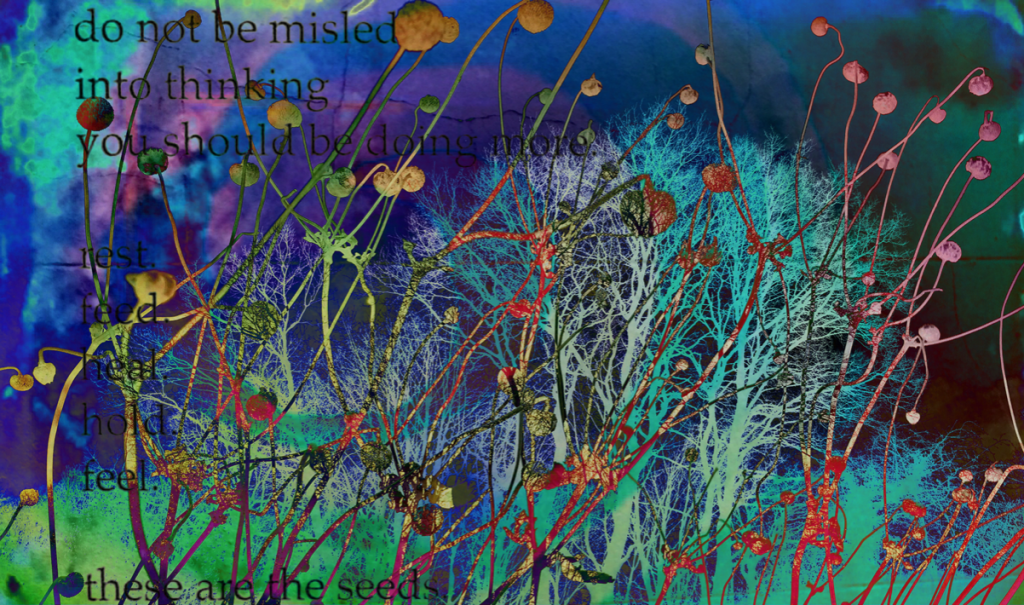
So how do I really learn to clear a space, to simplify, to listen to the sentence I just wrote rather than begin a new one? Since last summer my therapist has been urging me to finish some of the multiple creative projects I have on the go. Together we have noted, with compassion and affection, that my ‘genius’ for overcomplicating is related to my persistent habit of having ‘a hundred ideas before breakfast’. My sadness, my abiding sin perhaps you might call it, is that I carry this habit over into my spiritual life, always dipping into multiple sources throughout my morning’s ‘quiet’ time, thereby receiving multiple messages, multiple inspirations, multiple everything. Is it any wonder I struggle with brain fog? Is it any wonder I get overwhelmed by details? Is it any wonder there are days I just do not know where to start? Perhaps all this multiplying is part of a desperate subconscious assault on the brain: if I blast my system with enough holy reading surely some of it might get through and stick?
In his book Spiritual Intelligence Brian Draper asks:
… often the most profound awakenings arise from being willing to let go of the ‘Where now?’ or ‘What next?’ questions. In fact, most of us need to let go profoundly before we take anything more on. … We must clear a space in order to hear the still, small voice speak to us. But we must also be prepared, within that act of space-clearing, for yet more clearing to take place – to discern what we first need to surrender before we can more on with a lighter load. The poet, priest and mystic John O’Donohue once wrote that we must ‘clear thickets in the undergrowth of banality in our life’ so that we can overhear our true self. We should first clear space in order to ask, ‘What more should I clear?’ (25)
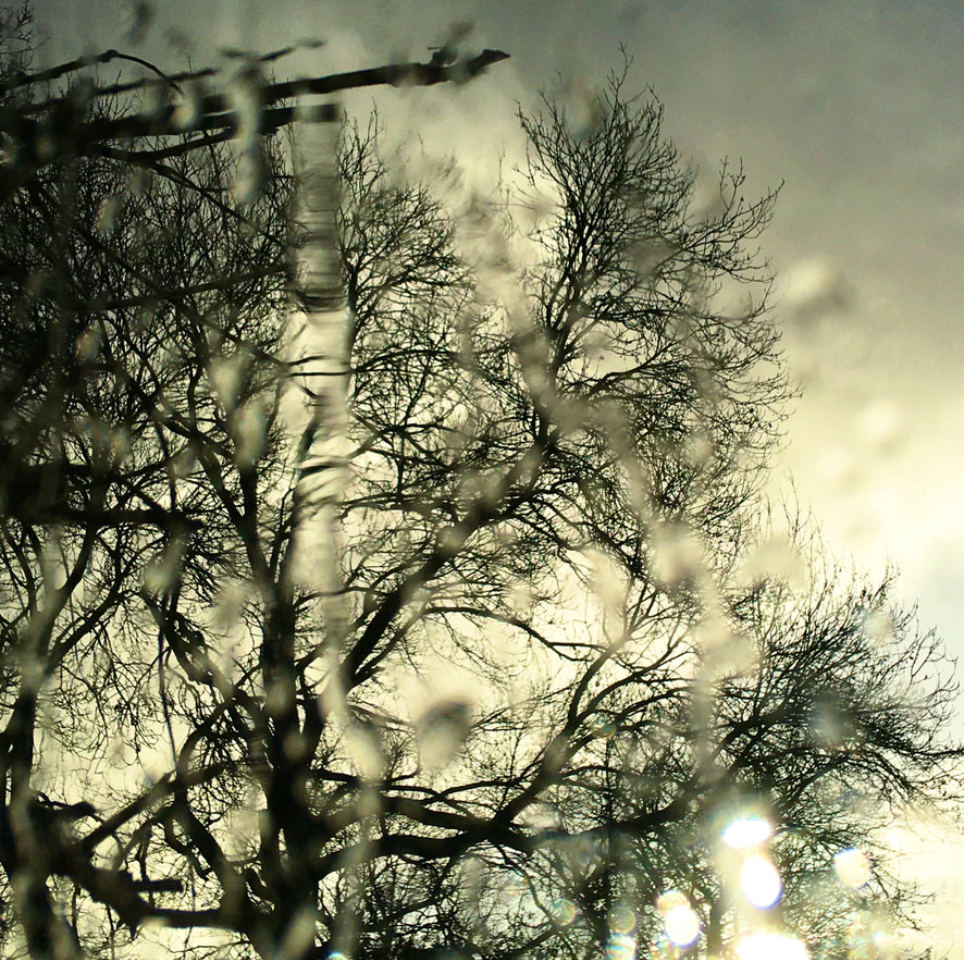
Over the course of the last thirty years I feel that I have had to let go of so much, due to chronic illness. Some days the grief of those dashed hopes and unfulfilled dreams threatens to overwhelm me, and I wonder if this grief makes me subconsciously cling to my present desires like a safety raft, utterly resistant to the idea that they too might need to be cleared out the way. But I have begun to learn to recognise that I need to let go of these most tenacious desires, and that the only way to do it is in every moment of every day. Father Thomas Keating called these engrained desires our ‘emotional drivers’: the desire for power and control; the desire for safety and security; the desire for affection, affirmation and esteem; the desire to change circumstance, situations, other people and myself.
Letting go of these ‘drivers’ is at the heart of Centering Prayer practice and most mornings for the last seven years I have prayed this prayer. Yet five minutes after I have prayed it, I catch myself repeating the desire I just prayed to release! In my case, the work of trying to overhear my True Self that Draper and O’Donohue point to, is a very halting process of trying to recognise where my ‘attachments’ and desires are leading me off into a cul-de-sac, away from the Way of God’s healing and flourishing. And once I have finally noticed, I have sabotaged myself again!
All I can do is sigh, smile at myself, and begin again: surrendering to the Winter hard work of trying to clear the brambles of myself out of the way, so I might have enough clarity to see the GodLight springing forth and join it with a joyful leap of faith.
(This is an excerpt of a longer piece written for imageintoikon.com)
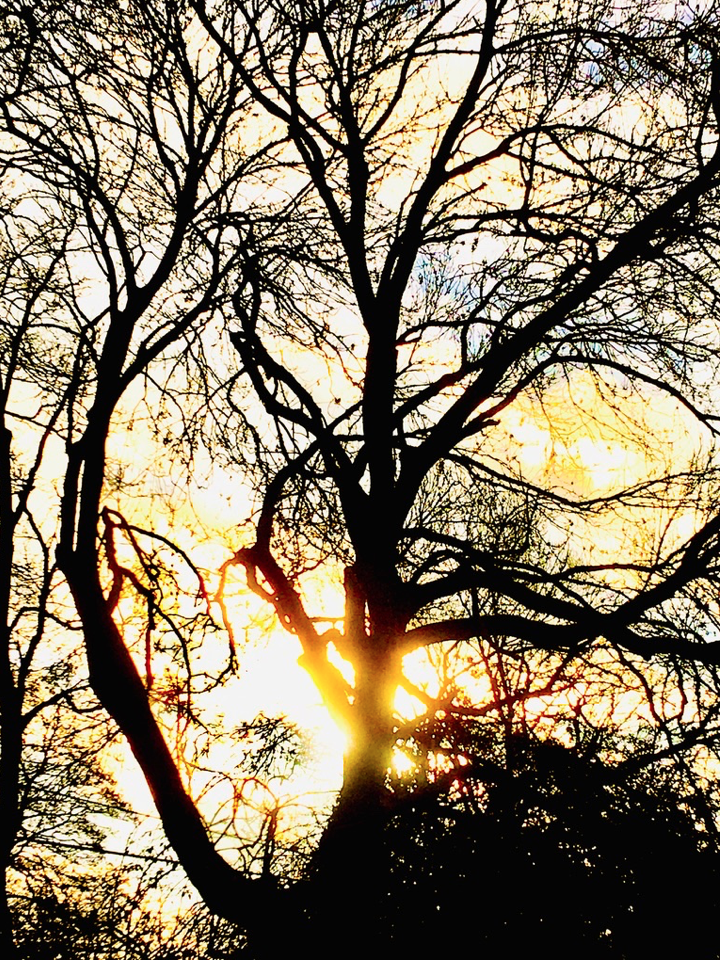
As an Amazon Associate, I receive a small amount for purchases made through appropriate links.
Thank you for supporting Godspace in this way.
When referencing or quoting Godspace Light, please be sure to include the Author (Christine Sine unless otherwise noted), the Title of the article or resource, the Source link where appropriate, and ©Godspacelight.com. Thank you!

